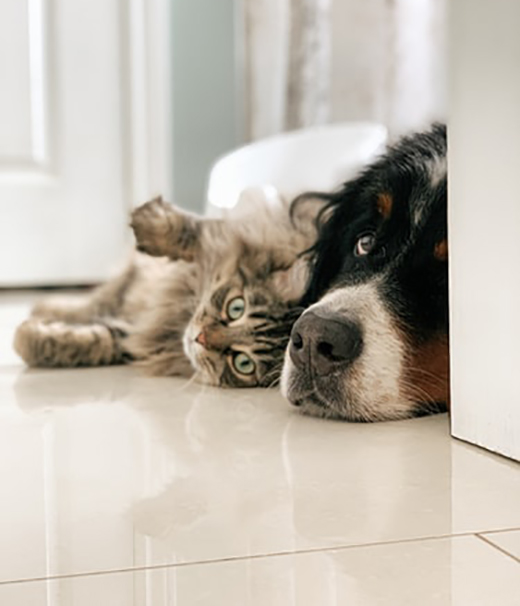K-State veterinarian has tips for keeping pets safe from household dangers
Friday, March 26, 2021

March is Pet Poison Prevention Month. A K-State veterinarians is reminding pet owners that their medications, plants and certain everyday household items can pose dangers to furry friends.
MANHATTAN — Certain everyday household items can pose a threat to pets' health, says Susan Nelson, clinical professor at the Kansas State University College of Veterinary Medicine. Here are some items and situations pets owners can watch for.
Human over-the-counter and prescription medications are a common cause of poisoning in pets. Nelson said it is important to remember that pets, especially dogs, are not very discriminating about what they eat. It is not uncommon for dogs to swallow human medications, like anti-anxiety pills or pain medication, such as aspirin, ibuprofen or acetaminophen, while they are chewing on a bottle. This accidental ingestion can lead to gastrointestinal issues, organ failure and possibly death.
Owners often give human medications to their pets, such as aspirin or ibuprofen, to help control their pain. Unfortunately, many of these medications are highly toxic to pets. Nelson said to always consult with your veterinarian before giving any type of human medication to your pet.
"If your pet does accidentally consume human medication, call your veterinarian first or a pet poison control hotline before taking any type of action when this happens," Nelson said. "Know the name of the medication the pet swallowed and how much they ingested, if known, as that can make a big difference on treatment recommendations. Sometimes we will advise owners to induce vomiting at home, but it is done on a case-by-case basis as inducing vomiting in some instances can cause more harm."
Nelson also warns pet owners to be cautious of any flavored medication their pet may currently be taking. These medications are made to smell and taste good to make them easier to give to pets. If left out, they will often be consumed all at once, which can possibly be harmful to a pet.
Many human foods are dangerous for pets. Some of the top foods on this list are chocolate, raisins, grapes, macadamia nuts, onions, garlic and yeast-based bread doughs, according to Nelson. Additionally, foods, candies, mouthwashes and other medications that contain the artificial sweetener xylitol are also toxic to pets and can cause life-threatening low blood sugar and liver failure.
"Be aware of moldy and spoiled food, too," Nelson said. "Keep trash cans covered because pets are very good at getting into them and eating something they shouldn't."
Commonly used products like bleach, all-purpose cleaners and other disinfectants can cause chemical burns on pets' skin and can be toxic if ingested. Nelson said this often happens because pets come into contact with the cleaner after the bottle spills on them, or they walk on a freshly washed floor or bathtub. Virus- and germ-killing household sprays can be toxic to cats when ingested, so it should be used very cautiously in households with cats.
"The best way to prevent such burns and toxic ingestion is to make sure surfaces are completely dry before letting pets on them and to tightly re-cap cleaning product bottles after using them," Nelson said. "Just as with children, don't forget to put such products away where pets can't get to them and always remember to read the warning labels and instructions on all household cleaners before using them."
Other common household toxins that owners might not think about are things like batteries, cigarettes and certain houseplants. If a pet ingests batteries, including button batteries, the battery acid can cause serious burns to their mouth, esophagus and stomach, Nelson said. They can also cause intestinal obstruction.
Common houseplants like philodendron and dieffenbachia are toxic to pets if ingested. Lilies can be especially dangerous to cats. It is a good idea to know what plants you have, both in your house and your yard, and if they are toxic to pets.
"Another thing to worry about is secondhand smoke," Nelson said. "Cats with owners who smoke are twice as likely to develop malignant lymphoma than cats with non-smoking owners. Be aware of cigarette butts that are left out because pets can develop nicotine poisoning if these are ingested."
Antifreeze is another potential danger for pets, especially for those who spend a lot of time outdoors or in the garage, Nelson said. Sometimes antifreeze will leak from a car onto the floor or into an existing puddle of water and pets may unintentionally drink it. A small amount of ingested antifreeze can be fatal to a dog or cat, causing the kidneys to shut down.
"Always keep antifreeze tightly sealed and out of reach from pets," Nelson said. "You also should check your vehicle frequently for antifreeze leaks. One should always make sure their pet has fresh drinking water available. The temptation to drink antifreeze, however, will still be there, so prevention is key."
Cannabis, or marijuana, has been legalized in many states now and veterinarians in these states are seeing a large increase in the number of pets with marijuana toxicity. Pets are more sensitive to the effects of the THC in marijuana and Nelson said it can be easy for your pet, especially dogs, to consume a toxic amount.
If your pet does come in contact with a dangerous material and you cannot reach your veterinarian, or your veterinarian is not familiar with the specific toxin or medication, Nelson recommends calling the Pet Poison Helpline 24/7 Animal Poison Control Center at 855-764-7661, or the American Society for the Prevention of Cruelty to Animals Animal Poison Control hotline at 888-426-4435.
